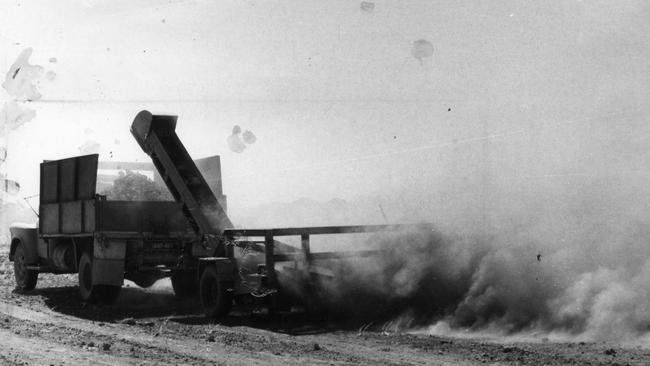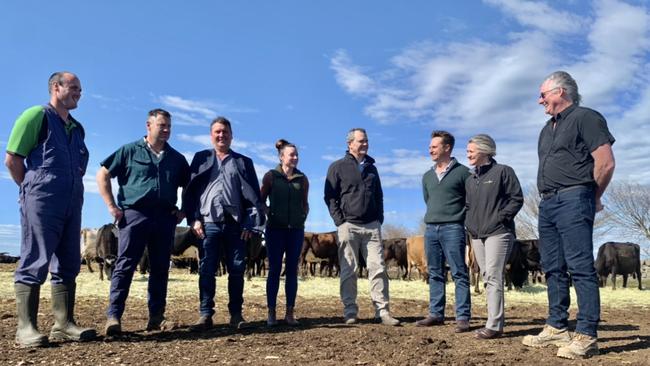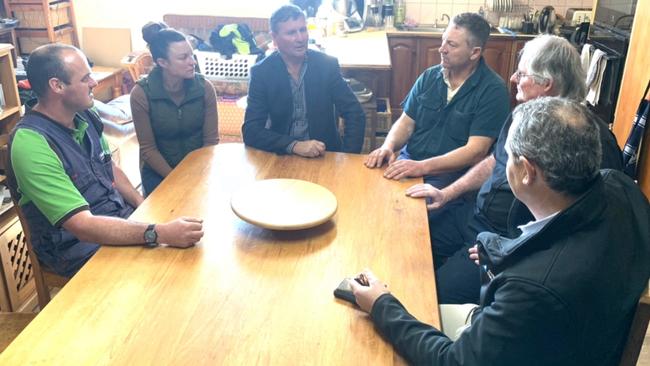Agriculture Victoria chiefs meet with drought-hit southwest farmers
Southwest Victorian farmers say the drought is the worst seen in the region since 1967 — with roadside roos an increasing problem.
FRIDAY
Livestock producers in the Casterton and Hamilton regions met with the Rural Assistance Commissioner as he wraps up a drought fact-finding tour of southwest Victoria.
Peter Tuohey spent his final day of the three-day trek in arguably the most parched part of the region and is set to report his findings to state Agriculture Minister Ros Spence.
Casterton region farmer Nick Harvey said only primary producers with long memories of the 1967 drought could recall a worse rainfall predicament.
“In an average financial year, we get about 700mm of rain. For the financial year just gone, we received 296mm — so it’s a huge difference,” the Strathdownie district farmer said.
“Even of the 296mm, 30mm fell on January 7 and evaporated not long after.
“We had a failed autumn, it’s edging towards a failed winter.
“It’s bringing back memories of 1967 – you’d have to go back that far to see rainfall numbers as low as they are now. The same applies across the border in South Australia, right up the coastline to Robe and Kingston.”

Mr Harvey said establishing a stock containment area — a carefully selected, small, fenced section of the property set up to intensively hold, feed and water livestock — had assisted his farming operation.
Victorian Farmers Federation livestock president Scott Young was in the Hamilton region last month for a drought-focused meeting.
He said bare paddocks across southwest Victoria and further afield meant kangaroo populations were stepping up the competition for feed with livestock.
“You only have to look at the roadsides too with the dead ‘roos trying to get a feed on the roadsides,” Mr Young said.
“Kangaroos are competing with livestock for fodder, the damage to fencelines are everywhere. “It’s one of the under-reported issues of the drought.”
WEDNESDAY
Drought-stricken farmers in southwest Victoria made fresh calls for assistance in face-to-face meetings with Victoria’s leading agricultural bureaucrats yesterday.
Australian Dairy Farmers president Ben Bennett hosted Agriculture Victoria chiefs Beth Jones and Dougal Purcell, along with Rural Assistance Commissioner Peter Tuohey, at Mr Bennett’s Pomborneit farm, near Colac.
Mr Bennett called for one-off emergency payments for drought-hit farmers, a move backed by United Dairyfarmers Victoria president Bernie Free, who also attended the kitchen-table meeting.
“It was a frank conversation and we’re making progress — next on the schedule is the Agriculture Minister (Ros Spence),” the ADF president said.
“We’re urging the state government to provide one-off emergency payments for drought-affected farmers, similar to those offered recently with the (October 2022) floods.
“We also want the state to re-establish previous grant programs, provided in 2020 and 2018 for Victoria’s most recent regional droughts.”

A former VFF president, Mr Tuohey was appointed Rural Assistance Commissioner by the then Andrews Government in response to the Gippsland and Mallee 2019 drought.
Mr Tuohey is set to meet with farmers and other community figures in the Casterton and Hamilton regions this week and will report his findings to the Agriculture Minister next week.
Ms Spence has indicated she too will visit the region in the coming weeks.
“Farmers are being hit hard by drought — this week is about listening and working out the next steps,” the commissioner said.
“In this circumstance (with the Bennett meeting), dairy farmers are really doing it tough because of the conditions over the last 12 to 18 months — their costs have gone up, their prices have gone down and the drought isn’t going away.
“I’ve seen a lot of passion and a lot of pain. You can see the pain farmers have felt, you can see the passion for farming.”
Mr Free said the drought would also require federal government input with tweaking of Regional Investment Corporation assistance.
“It’s good to see the state starting the process because this is shaping up to be a failed winter. But clearly, there’ll need to be federal involvement too,” the UDV president said.

Ms Jones said the Agriculture Victoria website summarised existing farmer support, as well as how to access the Rural Financial Counselling Service and loans through the Regional Investment Corporation.
“It’s important that we continue to have these conversations with producers in the southwest, many of whom are facing significant challenges as a result of the seasonal conditions,” Ms Jones said.
“There is a broad network of tailored programs and services available across the region; I encourage farmers to reach out and make use of these.”





